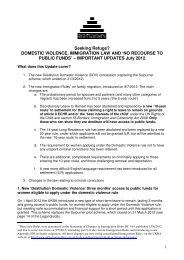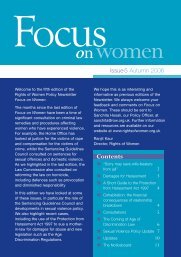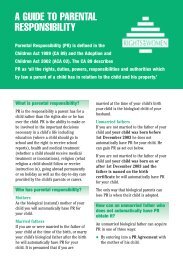Seeking Refuge? - Rights of Women
Seeking Refuge? - Rights of Women
Seeking Refuge? - Rights of Women
You also want an ePaper? Increase the reach of your titles
YUMPU automatically turns print PDFs into web optimized ePapers that Google loves.
• look at the law that determines who is entitled<br />
to remain in the UK; and<br />
• decide whether, according to the law, you are<br />
entitled to some form <strong>of</strong> protection in the UK.<br />
The law that determines whether or not<br />
someone is entitled to remain in the UK is set<br />
out in:<br />
• the <strong>Refuge</strong>e Convention 1951;<br />
• the European Convention on Human <strong>Rights</strong><br />
1950; and<br />
• European Union Law.<br />
For further information about these, see<br />
Chapter 2.<br />
This means that you must give your case-owner as<br />
much information as possible about yourself, why<br />
you left your country and why you cannot return<br />
there.<br />
Before the interview<br />
If possible, you should seek legal advice on your<br />
case from your legal representative before your<br />
interview. Your legal advisor can discuss the<br />
interview with you and answer any questions that<br />
you may have. Your legal advisor can also talk to<br />
you about your case and prepare a statement for<br />
you to hand to your case-owner at the start <strong>of</strong> the<br />
interview. A statement is a document that outlines<br />
what you say about your case. If your legal<br />
representative prepares a statement for you to<br />
give to your case-owner, then that statement will<br />
be the basis <strong>of</strong> your interview. Your case-owner<br />
will read it and then ask you questions.<br />
If your legal representative does not prepare a<br />
statement for you, or if you have not been able to<br />
see a legal representative before your interview,<br />
then you may find it useful to think about what<br />
you want to say before the interview and plan<br />
how you will say it.<br />
Recording the interview<br />
Asylum interviews can be recorded on tape so<br />
that there is an accurate record <strong>of</strong> what was said.<br />
It is very important that you have an accurate<br />
record <strong>of</strong> your interview in case there is a<br />
disagreement about what you (or the interpreter)<br />
did, or did not, say. You should, therefore, ask for<br />
your interview to be recorded on tape. If<br />
possible, you should do this at least 24 hours<br />
before the interview. However, the UK Border<br />
Agency has a legal obligation to record asylum<br />
interviews when requested, so you can ask for<br />
your interview to be recorded on the day, if<br />
necessary. This may mean that your interview is<br />
delayed.<br />
At the interview<br />
The interview is the basis <strong>of</strong> your claim for<br />
protection in the UK. This means that during the<br />
interview, you must tell your case-owner as much<br />
as possible about yourself, what you have<br />
experienced and why you need protection in the<br />
UK. You may have already given some information<br />
about yourself and what has happened to you to<br />
your case-owner, your legal representative or to<br />
someone else who works for the UK Border<br />
Agency, for example, when you were screened to<br />
have your identity checked. However, you will<br />
need to repeat all <strong>of</strong> this at the interview.<br />
You may be asked questions about particular<br />
issues by the case-owner. However, you must tell<br />
the case-owner as much as possible about your<br />
case, whether or not she (or he) asks you<br />
questions about particular issues. You may find<br />
this very difficult.<br />
Sometimes women find it hard to talk about<br />
certain things, for example if they have been<br />
raped or have experienced sexual violence. Even if<br />
it is difficult for you to talk about these things, it is<br />
very important that you tell the case-owner<br />
about it in the interview. If you are tired or upset<br />
during your interview you can ask for a break. If<br />
there is more that you want to tell the case-owner<br />
about a particular issue you should give them that<br />
information. This means that you should tell the<br />
case-owner about it, whether or not they have<br />
asked a question about the issue. The case-owner<br />
may not know about your case or what your<br />
country is like. At the end <strong>of</strong> the interview, the<br />
case-owner will ask you a question, such as: “Is<br />
there anything else that you want to say?” You<br />
should make sure at this point that you have said<br />
everything that you want to. If the case-owner<br />
does not give you time to tell her (or him)<br />
everything, you should say that there is more that<br />
you want to say, but that you are not being given<br />
enough time.<br />
Supporting evidence<br />
You may have documents that confirm who you<br />
are, or something that is part <strong>of</strong> your case, such as<br />
a political party membership card. If you have<br />
evidence that supports what you say, you should<br />
show it to your legal representative and take it<br />
with you to the interview. You should ensure that<br />
33
















